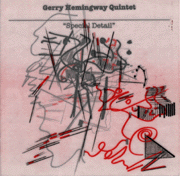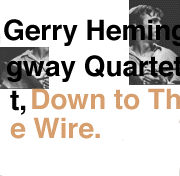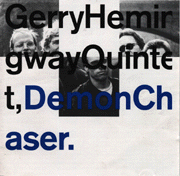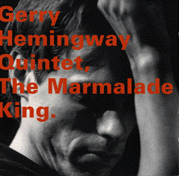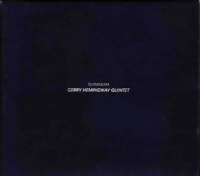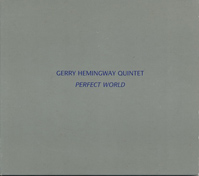Gerry
Hemingway Quintet
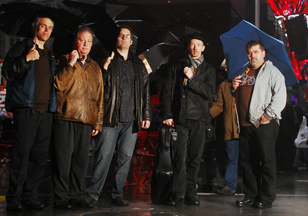 2008 - currently active (US "Riptide" Quintet) 2008 - currently active (US "Riptide" Quintet)
Oscar Noriega-clarinet,
bass clarinet, contrabass clarinet
Ellery Eskelin-tenor saxophone
Terrence McManus-guitars
Kermit Driscoll-el & ac bass
Gerry Hemingway-drums
|
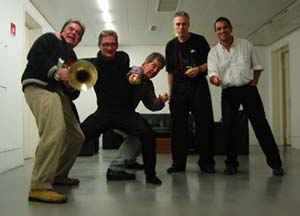 2002 (Double Blues Crossing Quintet) 2002 (Double Blues Crossing Quintet)
Frank Gratkowski-clarinet,
bass clarinet, alto saxophone
Wolter Wierbos-trombone
Amit Sen-cello
Kermit Driscoll-acoustic and electric bass
Gerry Hemingway-drums, marimba, sampler
|
 2000 (Swedish Quintet) 2000 (Swedish Quintet)
Per "Texas" Johansson-clarinet,
bass clarinet, contrabass clarinet
Wolter Wierbos-trombone
Amit Sen-cello
Palle Danielsson-bass
Gerry Hemingway-drums
|
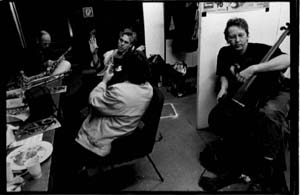 1990-1998 (90's Quintet) 1990-1998 (90's Quintet)
Michael
Moore-reeds
Wolter Wierbos-trombone
Ernst Reijseger-cello
Mark Dresser-bass
Gerry Hemingway-drums
|
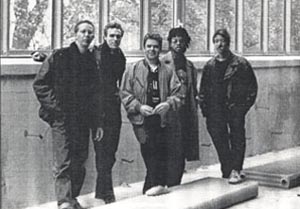 1989-1990
(Special Detail) 1989-1990
(Special Detail)
Don
Byron-clarinet, bass clarinet, baritone saxophone
Wolter Wierbos-trombone
Ernst Reijseger-cello
Ed Schuller-bass
Gerry Hemingway-drums |
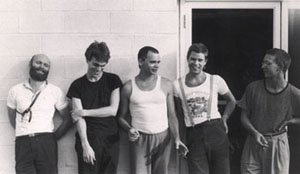 1985
(Outerbridge Crossing) 1985
(Outerbridge Crossing)
David
Mott -baritone saxophone
Ray Anderson-trombone
Ernst Reijseger-cello
Mark Helias-bass
Gerry Hemingway-drums
|
"Intensely
focused but loose and down to earth, the quintet often suggests a chamber group
with the spirit of street band." Boston Globe, Fernando Gonzales
The current version of the quintet since 2008 starting with a performance at the Tea Lounge in Brooklyn, has evolved from Hemingway's long standing compositional platform that began in 1985 with the recording of "Outerbridge Crossing" and has enjoyed numerous incarnations while retaining its penchant for an integrative compositional/improvisational ensemble approach. What that adds up to is a compositional practice that has refined a way to frame the individual member's unique sonic, interpretive and improvisational vocabulary with pieces that are detailed, structured and rich with content. The character of the music is multi-faceted, from coloristic subtlety to visceral intensity, sometimes the groove is deep and other times the rhythmic interplay is elaborate and mischievous.
The quintet currently performs material from their soon to be released CD entitled "Riptide" which was released on July 6, 2012 on the Clean Feed label as well as presenting some re-arrangments of previous quintet material for this new instrumentation and personnel which combines players from ongoing & previous quartet and quintet projects.
The group will tour Europe in the autumn of 2012.
Saalfelden 2012 Festival Quintet concert review
Mit Superlativen sollte man sparsam umgehen, aber das vermutlich schönste Konzert lieferte dieses Jahr Gerry Hemingway, natürlich wieder ein Drummer. Seine weitläufigen, suitenartigen Stücke haben Leichtigkeit und Vielfalt, stellen die Kumpane in den Vordergrund, ohne den Zusammenhang, die glasklare Logik zu verlieren. Mit dabei: Oscar Noriega und Ellery Eskelin (Reeds), der brillante Gitarrist Terrence McManus und Bassist Kermit Driscoll.
english translation:
Superlatives should be used sparingly, but probably the nicest concert delivered this year Gerry Hemingway, again, of course, a drummer. Its spacious, suite-like pieces have ease and variety, are the cronies in the foreground, without the context, losing the crystal clear logic. Also present: Oscar Noriega and Ellery Eskelin (Reed) the brilliant guitarist Terrence McManus and Bassist Kermit Driscoll. Very great music.
Christoph Haunschmid - freiStil - (issue #45 - Oct/Nov 2012 issue)
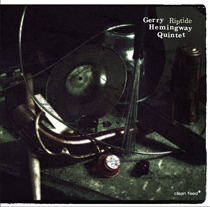
Gerry Hemingway Quintet
Riptide
Clean Feed CF227CD
For an artist with such an extensive track record and a list of fellow conspirators as Hemingway, his career is actually remarkably consistent. Many of his generation or scene contemporaries (and certainly the drummers) have a tendency to pigeon behavior and excel in discographies conspicuous of perhaps a frenzied greed, however with Hemingway you always have some constants. He was for twelve years a member of the acclaimed quartet with Anthony Braxton, Mark Dresser and Marilyn Crispell, he plays now for over thirty years with Mark Helias & Ray Anderson in BassDrumBone, and his own quintet is now also an equally strong holder of adventurous jazz.
In the 90's more dominated by the (semi) Dutch like Michael Moore, Ernst Reijseger and Wolter Wierbos, the Quintet of 2012 is actually a New York based group, with horns Oscar Noriega (alto sax, clarinet, bass clarinet), Ellery Eskelin (tenor sax), Kermit Driscoll bassist and guitarist Terrence McManus. Hemingway's compositions cover, as always, many worlds, where he still ensures that the five members act as a collective where there is plenty of room for personal expression, which can go from nervous bouncing - the title track has an angularity which seems akin to Lehman/Threadgill- albums on Pi Recordings - and graceful abstraction ("Gitar", where Hemingway himself plays harmonica!) to the intricate structures of "Sumna" and "Holler Up".
There is here and there a flirting with a pastoral, folky vibe ("At Anytime"), but also more exciting, with African folk leaning material as "Backabacka", by a surprising moment of silence separated from the equally catchy closer "Chicken Blood". By Driscoll's funky bass lines (in some compositions on electric bass) and Hemingway's equally colorful drumming style, it is additionally sometimes surprisingly danceable. McManus plays often a fairly modest role, but what goes on in the background is sometimes more stubborn to work as a Libery Ellman, while in "Meddle Music" yet a surprisingly prickly part.
The collective sound of this quintet is on paper a little less eccentric than that of the earlier albums, which were highlighted by cello and trombone, but the Hemingway touch is fully intact. This is absolutely gourmet jazz, but also such that it can attract a new gardening of enthusiasts. The coherence of the album and almost unnoticed way the pieces blend into each other, making it a successful special listening experience. Perhaps the ideal introduction to the quintet and by extension the endlessly fascinating world of this composing drummer. Draai om je oren Jazz en meer - Weblog - Guy Peters, 24.10.12
It's a date filled with good improvisations, sometimes collective with horns and guitar taking the front line, sometimes individual. The compositions are excellent frameworks for the band, devoid of cliche..This is just an example of the ensemble's strengths: they listen to one another and compliment what is going on while articulating the compositional elements along the way. Gapplegate Music review by Grego Edwards
From the mid 80s through the mid 90s, Gerry Hemingway put out a series of seminal recordings, melding the collective strategies he had developed as part of Anthony Braxton's quartet with the sense of loose-limbed free swing honed with players like Ray Anderson, Mark Helias, George Lewis, Wadada Leo Smith, and other members of the burgeoning New Haven scene in the late 70s. Starting with the long out-of-print Outerbridge Crossing and on through a series of releases on Hat Art, Random Acoustics, and GM Recordings, Hemingway built a distinctive approach to small-group composition, making use of captivating metrical layering, snaking melodic threads, and plenty of room for collective improvisation. Core to that concept was a stable band with Michael Moore, Wolter Wierbos, Ernst Reijseger, and Mark Dresser. Since then, Hemingway's pulled together various bands with musicians like Ellery Eskelin, Herb Robertson, Frank Gratkowski, and Mark Helias; while all have had their high-points, none have quite gelled like earlier recordings. With this newest ensemble, Hemingway has once again found that group alignment. Oscar Noriega (on alto sax, clarinet, and bass clarinet) is paired with Eskelin's tenor, and Kermit Driscoll is on board playing acoustic and electric bass; but the big change is the inclusion of guitarist Terrence McManus, whose contributions move from gentle washes to spiky, overdriven skronk. The group attacks the leader's themes, moving from lush voicings to angular counterpoint, collectively pushing an elastic approach to the pieces' harmonic and rhythmic structures. There's a song-like quality to Hemingway's writing and that often comes to the fore, as on "Gitar", which uses percolating cross-rhythms across a backbeat to support the reed players' arcing lines, until things open up for a driving guitar solo full of cutting distortion. There's also a marked nod to kwela groove throughout, on "At Anytime", "Holler Up", and "Backabacka". The recording is meticulously paced, the pieces seguing into each other in suite-like fashion, with a perfect balance between collective improvisations and thoughtfully-wrought solos. Let's hope Hemingway can keep this crew together for a while. Paris Transatlantic review by Michael Rosenstein
We note in jazz history, great leaders drummers, Art Blakey and Max Roach in mind. Gerry Hemingway indisputably belongs to this lineage, leading a quintet (sometimes quartet) since 1985; quintet that has endured, evolves and renews itself. The grouping who comes to us is new, even if it includes the saxophonist Ellery Eskelin, who played (and recorded, including Clean Feed) long with Hemingway. Solid tenor, who occupied the center stage a few years ago, Eskelin is here is compatible, with the altoist and clarinetist Oscar Noriega Mexican-American to play extremely dynamic and invigorating (note that he worked with Tom Rainey). A modern mainstream perfectly assumed: rather rock guitar solos, powerful rhythms ... The Gerry Hemingway Quintet remains a force in jazz today. Culture Jazz (France) review by Jean Buzelin
F.rom his seminal efforts in the late '70s, through his tenure with Anthony Braxton's revered '80s Quartet, Gerry Hemingway has grown from a virtuosic percussionist into a well-rounded artist whose writing is as elaborate as his adroit improvisations. Interweaving multiple layers of pre-written material and unstructured interludes into episodic narratives, his compositions exude the sophisticated aura of chamber music buoyed by the primal immediacy of indigenous folk forms. No stranger to multi-culturalism, Hemingway has long drawn on musical traditions outside of Western hegemony; in addition to myriad ethnic rhythms, his abiding interest in the joyous grooves of South African kwela make their strongest appearance yet on Riptide, the studio debut of Hemingway's new Quintet.
Maintaining consistency for the sake of his songbook, Hemingway has employed a two-horn front-line and a stringed instrument (usually cello) supported by bass and drums in his various quintets ever since 1985's Outerbridge Crossing (Sound Aspects). However, it was his much admired '90s Quintet with multi-reedist Michael Moore, trombonist Wolter Wierbos, cellist Ernst Reijseger and bassist Mark Dresser that defined this aesthetic. Mirroring the tonal and textural range of that line-up, the newest incarnation features relative newcomers Oscar Noriega (alto saxophone, clarinet, bass clarinet) and Terrence McManus (guitars) alongside veterans Ellery Eskelin (tenor saxophone) and Kermit Driscoll (acoustic bass and electric bass guitar). Hemingway's talent for framing each member's voice within unique settings yields an array of kaleidoscopic detail, ranging from introspective impressionism to impetuous intensity.
While Hemingway's writing is engaging in smaller configurations (like his various quartets), it is the inclusion of a fifth voice that best facilitates his flair for intricate counterpoint and contrary motion. Embracing this role, McManus fills Reijseger's former position as the primary chord-based instrumentalist, adding an electrified patina to Hemingway's primarily acoustic Quintet oeuvre with his heavily amplified fretwork. McManus' capacity for wringing novel variations from overdriven pick-ups is revealed on the aptly titled "Gitar" and "Meddle Music," where he conjures a compelling series of minimalist motifs from peals of feedback shaped by brusque, siren-like punctuations. He spearheads the inverted structural dynamic of the epic title track with scorching arpeggios, as the horns unleash staccato accents in opposition to the rhythm section's languid countermelody, creating a labyrinthine setting for Noriega's serpentine alto. McManus also contributes understated support on pieces like the impressionistic tone poem "Asamine" and the countrified Afro-pop hybrid "At Anytime," which inspires a series of euphonious ruminations from Eskelin and Noriega. Eskelin's longstanding familiarity with the intricacies of Hemingway's concepts comes to the fore in the hypnotic funk of "Gitar," which features one of the tenor saxophonist's more lyrical performances. Another veteran sideman of Hemingway's, Driscoll brings a diverse mix of austere acoustic support and jubilant electric bounce to the proceedings.
Other than a brief unaccompanied excursion on the title track, Hemingway largely eschews drum solos, preferring to imaginatively work embellishments and variations into the Quintet's congenial interplay. His effortless modulations between time signatures and timbral dynamics prove endlessly fascinating, yet his surprisingly unorthodox arrangements and idiosyncratic reinterpretations of conventional forms are equally impressive. Time-honored genre tenets are transposed into adventurous yet accessible motifs; the rubato swing underlying the effervescent theme to "Holler Up" and the abstract blues extemporizations of "Meddle Music" subtly deconstruct hallowed traditions, while the stirring kwela rhythms of "Backabacka" evoke festive South African customs. Most of Hemingway's quartet and quintet records since 1996's Perfect World (Random Acoustics) end with a celebratory kwela tune. While the ebullient "Backabacka" sets the stage for such a finale, after a minute of silence between cuts the thorny syncopated funk of "Chicken Blood" materializes, with its multiple phrase lengths and polyphonic harmonies serving as the final coda; a reminder that though Hemingway's opulent compositions cover a broad stylistic spectrum, their subtle differences are always sublimated into his singular language.
-Troy Collins Point of Departure September 2011 Issue
Over the past 25 years, the lineup of drummer/percussionist Gerry Hemingway's quintet might have changed, but his central organizing concepts have remained constant. Like a working dog, specifically a shepherd, he always seems to be organizing chaos and safeguarding melody. Well, that is, when he isn't inciting the tumult.
The most recent variation of his quintet floats a two-horn, Oscar Noriega and Ellery Eskelin frontline, along with Hemmingway's his recent favorite collaborator, guitarist Terrence McManus, and bassist Kermit Driscoll.
The percussionist's fame might have come by way of his membership in the prestigious Anthony Braxton Quartet of the 1980s and '90s. But his post-Braxton work in the WHO trio, BassDrumBone, his Quartets and Quintets, solo performance, and duos with the likes of Marilyn Crispell, Ivo Perelman, John Butcher, and has elevated Hemmingway's status to master musician.
Riptide opens with the light-treading "Sumna," with Hemingway working the brushes against Driscoll's acoustic pulse and the clarinet/tenor saxophone dance of Noriega and Eskelin. With McManus plucking tight ebullient patterns, the quintet announces that these blues are not to be drawn from an atrabilious well. Like the title track suggests, each piece flows continuously into the next, as if the music, although of differing temperatures and currents, is part of one ocean of sound. The fevered pitch of the title track swaps roles, with the two horns creating the pulse while Hemingway, McManus, and Driscoll tear off chunks of notes.
From this frenzied piece the disc sails into calmer and varied seas; from the gentle, almost folkloric gliding "At Anytime" to the funked0up "Meddle Music," the quintet seems to signal that musical genres are no longer an inhibitor to creation. The quintet takes a trip to the Caribbean on "Backabacka," and dreamland with "Holler Up," where McManus sets up the sweet dance of Noriega's bass clarinet and Eskelin's tenor saxophone gambol.
The overriding feel of Riptide is one of unabated joy. Mark Corroto AAJ September 5, 2011
**** (four star - translated from Italian) Twenty-four years, nine disks released, eighteen musicians involved: Michael Moore, Don Byron, Mark Dresser, Walter Wierbos, passing by Ray Anderson, Frank Gratkowski, Ernst Reijseger and Palle Danielsson. It has come a long way the Gerry Hemingway Quintet since 1987, when the Outerbridge Crossing, which was released by Sound Aspects, marked the debut recording of the then fledgling training.
It has come a long way and has written unforgettable pages in the great book of contemporary jazz, drawing a parable of the plurality of solutions dedicated to art and the variety of outcomes, yet supported by an undeniable consistency to be a logical development that makes every chapter in the history of the band a step further along the same path of research.
Riptide, published by the Clean Feed, picks up where the previous Double Crossing Blues, published by Between the Lines in 2005, stopped. And it does so by offering a pair of new substantial artists as regards the line-up. Outside the trombone and cello, which since the first of five editions of the band had always been present in the clarinet Oscar Noriega and the guitars of the exposure Terrence McManus,heard together with Hemingway in duo on the excellent recently discovered Below the Surface of. Needless to point out that in terms of tonal alternations weigh: the clarinets of Noriega stealthily creep slyly into the dealings of the music, lightening the specific gravity of the sound, while the guitars and the sound effects, McManus provide a palette of colors that are ever colorful.
And though the consistency of which we spoke a few lines above is also present. The common thread that binds the past Riptide there and emerges from the usual taste for the plots, the unbridled passion for counterpoint, that sense of rhythm and everything Hemingway concepts such as pulse, elastic. The initial "Summa" is illuminating in this respect: above the drummer's beat chic intersect the other four instruments, the sax, Eskelin that joke after joke, emerges and takes over. The interplay of joints is discreet and gentle, but after repeat listening, focusing on one voice at a time, you realize how complicated is the development of the song. Same goes for the neurotic "Riptide," who lives the opposition between two lines: the the martial punctuated by the wind, and zigzag and pressing enunciated by guitar, with his back covered by electric bass and drums.
Salvaged and re-read "Gitar" and "Holler Up": the first from Waltzes, Two-Steps & Other Matters of Head of '99, the second from the Demon Chaser '93. Particularly successful and perky "BackaBacka," composition which, by continuity, reminds us of the passion never appeased by Hemingway for the South African kwela; passion that comes out more veiled and seductive as ever in "At Anytime," whereas "Chicken Blood" and "Meddle Music" suggest that, after all, we are still in New York. Luca Canini All About Jazz Italia
A quintet with two horns and a rhythm section is a classic jazz lineup, and drummer Gerry Hemingway has long been enamored of this traditional form. In fact, for the past twenty-six years, Hemingway has reformatted his quintet several times, with earlier members including notable musicians such as clarinetist Don Byron, trombonist Ray Anderson, and bassists Mark Dresser and Ed Schuller. The latest incarnation of his quintet features Oscar Noriega on alto sax and clarinets, Ellery Eskelin on tenor sax, Terrence McManus on guitars, and Kermit Driscoll on acoustic bass and electric bass guitar. Their new release Riptide is a joyful CD full of beautiful music, nine multi-textured compositions by Hemingway that shine bright as the sun.
A few songs deserve special mention. The title track "Riptide" is extraordinary: the song starts off with wild, rollicking energy that does in fact sound like the sea, a clattering of shells in a swirl of liquid energy. It's an interesting arrangement where the horns provide steady accents and the guitars stretch and dance over them. All the soloists cut loose, with the saxes bending and soaring on bold, shifting runs, and the guitar and bass unfurling deep discordant chords, urgent and wild and tidal.
"Meddle Music" is a fabulously funky tune. Again it's an interesting arrangement, with McManus keeping a steady drone under the horn's tight front line. After the initial melody, the song breaks into a kind of abstract funk, with Hemingway and Driscoll shifting the rhythm at will. For those who enjoy the power of the electric guitar, McManus' solo is a powerhouse; he cuts loose and dives into discordance and feedback with complete freedom.
The CD's special gem is the tune "Backabacka." Liner note writer Brian Morton calls the music "heterodox kwela," referring to the South African street music known for its skiffle-like beat. The song has a spritely melody and a light, playful swing, and all the musicians play their hearts out. It's an immensely pleasing song that radiates pure joy; this is the one to play on a rainy day when your spirit needs a boost.
In addition to the excellent music, mention must be made of the insightful liner notes by Brian Morton, who is perhaps best known for his work on the Penguin Guide to Jazz series. Here Morton shows everyone how it's done, weaving a charming narrative that helps the listener to listen and appreciate the music at hand.
Hemingway's quintet is certainly capable of a multitude of moods and genres, and altogether Riptide is a rich, unusual CD, a treasure of sounds and rhythms and dancing lines. And Hemingway proves once again that tradition doesn't necessarily mean stale, witness the fresh breath he infuses into this classic jazz lineup. Florence Wetzl Squid's Ear December 2011
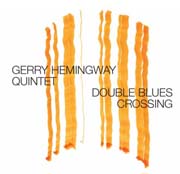 The
quintet's 2002 formation performed and recorded on October 30th of 2002 at
Centro Cultural de Belém in Lisbon, Portugal. The personnel for this performance and recording included
Frank Gratkowski (Germany) on reeds, Wolter Wierbos (Netherlands) on trombone,
Amit Sen (Sweden) on cello and Kermit Driscoll (US) on acoustic and electric bass.
Editing and production of the multitrack recording took quite awhile and was finally released in 2005 on Between the Lines.The recording is entitled Double Blues Crossing and recently reviewed in Downbeat magazine (read review) and also OneFinalNote and AllAboutJazz (by John Eyles) AAJ NYC(Kurt Gottschalk). Listen to Real Player excerpts from Artist Direct or stream or download mp3 excerpts from this site.
The
quintet's 2002 formation performed and recorded on October 30th of 2002 at
Centro Cultural de Belém in Lisbon, Portugal. The personnel for this performance and recording included
Frank Gratkowski (Germany) on reeds, Wolter Wierbos (Netherlands) on trombone,
Amit Sen (Sweden) on cello and Kermit Driscoll (US) on acoustic and electric bass.
Editing and production of the multitrack recording took quite awhile and was finally released in 2005 on Between the Lines.The recording is entitled Double Blues Crossing and recently reviewed in Downbeat magazine (read review) and also OneFinalNote and AllAboutJazz (by John Eyles) AAJ NYC(Kurt Gottschalk). Listen to Real Player excerpts from Artist Direct or stream or download mp3 excerpts from this site.
"The music ranges from swinging post-bop to sound explorations and always holds one's interest due to the highly expressive sounds of the musicians." Scott Yanow, All Music Guide
"Joining Hemingway is an excellent band that includes reed player Frank Gratkowski, trombonist Wolter Wierbos, cellist Amit Sen and bassist Kermit Driscoll. That they execute the formally eccentric compositions with such a combination of meticulousness and palpable enthusiasm says a lot about the quality of Hemingway's leadership. The solo work is fine (Wierbos is stunning), but the compositions are the star of the show. Hemingway is going where few jazz musicians have gone before, and he's doing it with rare intelligence and musical sophistication. In fact, this album is so good, I'm inspired to dust off the most hackneyed two-word phrase in the critic's lexicon: "highly recommended." Seldom has its use been more apt."
Chris Kelsey, CounterCurrents - JazzTimes
In March of 2001, I performed repertoire of the quintet
with different personnel primarily based in Sweden, including Per "Texas"
Johansson on clarinets, Amit Sen on cello and Palle Danielsson on bass. Wolter
Wierbos who was part of the original personnel filled out the group. This
quintet was part of a larger ensemble project done under the auspices of the
organization NYA Perspektiv.
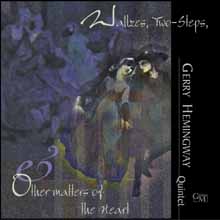  The 1990's quintet, whose
personnel remained intact for over eight years, gave it's final performances
in July of 1998 at the Nicklesdorf Konfrontation and Clusone Jazz festivals.
In October of 1999 GM Recordings released the long awaited cd compiled from our '96
tour entitled "Waltzes, Two-Steps and Other Matters of the Heart"
(see reviews below). The 1990's quintet, whose
personnel remained intact for over eight years, gave it's final performances
in July of 1998 at the Nicklesdorf Konfrontation and Clusone Jazz festivals.
In October of 1999 GM Recordings released the long awaited cd compiled from our '96
tour entitled "Waltzes, Two-Steps and Other Matters of the Heart"
(see reviews below).
Excerpts
of reviews of "Waltzes, Two-Steps and other Matters of the Heart":
"This
finely attuned fivesome under the percussionist's leadership developed a powerful
group empathy without submerging individual qualities. At their best, the band
eschews conventional fireworks for a deft ensemble cohesion and interaction." Pulse! by Art Lange
"Hemingway
aptly balances improvisational guile with superb script, resulting in a haunting
collection of freewheeling third-stream songs." JazzTimes by John Murph
"These
five musicians have left a fine legacy of recorded material to document fully
their incredible artistry. This recording is just one more example of their
brilliant contributions to creative music." Cadence by Frank Rubilino
Two
observations on our performance at the Berliner Jazzfest '96:
"The
highlights? For one, the quintet of the American percussionist Gerry Hemingway.
Unpretentious allround musicians, who deal with willfully playful, intelligent
compositions in such an intensive way, that one never gets enough of it. No
festival needs more innovations as presented by musicians like them. " Frankfurter Rundschau (Nov.
8, 1996)
"Here we heard music that got its inspiration and sound both from the experience with comtemporary avant-garde as well as the reflection from the traditions of folklore. This concert belonged to the most impressive ones given at the festival."
Süddeutsche Zeitung (Nov. 7, 1996)
.....and
another from our performance at the Tampere Jazz Happening '96 in Finland:
"Tampere's
Jazz Happening's best act was the last act, Gerry Hemingway 's American-Dutch
Quintet .....Hemingway showed a very creative and original approach to composition.
He combined subtle tonal characters and complex musical structures with the
swinging confidence of a streetband." Jukka Haaru, Helsingen
Sanomat/Finland (11/96) |
Re-release Covers of Perfect World and Demon Chaser
 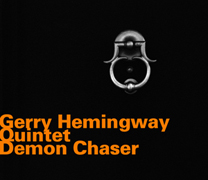
|
Outerbridge Crossing - recorded in 1985 in New Haven, CT and released on Sound Aspect Records as an LP in 1988, and later as a CD
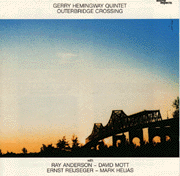
 2008 - currently active (US "Riptide" Quintet)
2008 - currently active (US "Riptide" Quintet) 2002 (Double Blues Crossing Quintet)
2002 (Double Blues Crossing Quintet) 2000 (Swedish Quintet)
2000 (Swedish Quintet) 1990-1998 (90's Quintet)
1990-1998 (90's Quintet) 1989-1990
(Special Detail)
1989-1990
(Special Detail) 1985
(Outerbridge Crossing)
1985
(Outerbridge Crossing)
 The
quintet's 2002 formation performed and recorded on October 30th of 2002 at
Centro Cultural de Belém in Lisbon, Portugal. The personnel for this performance and recording included
Frank Gratkowski (Germany) on reeds, Wolter Wierbos (Netherlands) on trombone,
Amit Sen (Sweden) on cello and Kermit Driscoll (US) on acoustic and electric bass.
Editing and production of the multitrack recording took quite awhile and was finally released in 2005 on
The
quintet's 2002 formation performed and recorded on October 30th of 2002 at
Centro Cultural de Belém in Lisbon, Portugal. The personnel for this performance and recording included
Frank Gratkowski (Germany) on reeds, Wolter Wierbos (Netherlands) on trombone,
Amit Sen (Sweden) on cello and Kermit Driscoll (US) on acoustic and electric bass.
Editing and production of the multitrack recording took quite awhile and was finally released in 2005 on 
 The 1990's quintet, whose
personnel remained intact for over eight years, gave it's final performances
in July of 1998 at the Nicklesdorf Konfrontation and Clusone Jazz festivals.
In October of 1999 GM Recordings released the long awaited cd compiled from our '96
tour entitled "Waltzes, Two-Steps and Other Matters of the Heart"
(see reviews below).
The 1990's quintet, whose
personnel remained intact for over eight years, gave it's final performances
in July of 1998 at the Nicklesdorf Konfrontation and Clusone Jazz festivals.
In October of 1999 GM Recordings released the long awaited cd compiled from our '96
tour entitled "Waltzes, Two-Steps and Other Matters of the Heart"
(see reviews below).